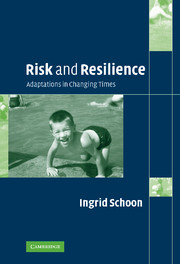Book contents
- Frontmatter
- Contents
- List of figures
- List of tables
- Foreword by Glen H. Elder, Jr
- Preface by John Bynner
- Acknowledgements
- Introduction
- 1 Risk and resilience: definitions
- 2 Towards a developmental-contextual systems model of adjustment
- 3 Persisting inequalities in times of social change
- 4 Selection, causation and cumulative risk effects
- 5 Protective factors and processes
- 6 Stability of early adjustment over time
- 7 Personal goals and life plans
- 8 Conclusions and outlook
- 9 Implications of findings for interventions and social policy
- Appendix A Two British birth cohorts
- Appendix B Response rates and handling of missing data
- Appendix C Description of variables used in the study
- References
- Index
9 - Implications of findings for interventions and social policy
Published online by Cambridge University Press: 22 September 2009
- Frontmatter
- Contents
- List of figures
- List of tables
- Foreword by Glen H. Elder, Jr
- Preface by John Bynner
- Acknowledgements
- Introduction
- 1 Risk and resilience: definitions
- 2 Towards a developmental-contextual systems model of adjustment
- 3 Persisting inequalities in times of social change
- 4 Selection, causation and cumulative risk effects
- 5 Protective factors and processes
- 6 Stability of early adjustment over time
- 7 Personal goals and life plans
- 8 Conclusions and outlook
- 9 Implications of findings for interventions and social policy
- Appendix A Two British birth cohorts
- Appendix B Response rates and handling of missing data
- Appendix C Description of variables used in the study
- References
- Index
Summary
‘The goal, in other words, is not simply to help talented children from poor backgrounds progress up the social ladder, and so have access to a broader range of goods and opportunities than their less-talented peers, but to challenge the very existence of an exclusive and divided society, in which access to public goods such as health and education depends on one's social position.’
(Bamfield, 2004)In this final chapter the evidence presented here will be evaluated and suggestions and directions for interventions put forward, thereby shifting the focus of concern from basic to applied science. What can be done to facilitate the development of individual potential and to enable individuals to overcome the odds stacked against them? Knowledge about protective factors and processes involved in positive adaptation can bring a new impetus to the development of social policies aiming to promote the well-being of disadvantaged children and populations. The focus of this study has been on the factors and processes most important for the development and maintenance of academic resilience in the face of socio-economic adversity. Given the central importance of both socio-economic risk and educational attainment in our culture, as well as their long-term consequences across domains, the findings will also be helpful for informing our understanding of other domains of adjustment. Yet, it has to be kept in mind that findings from one context or population may not apply to another.
- Type
- Chapter
- Information
- Risk and ResilienceAdaptations in Changing Times, pp. 157 - 169Publisher: Cambridge University PressPrint publication year: 2006



